During the webinar, Mary outlined four main feedback levels:
1. Task level feedback
Task level feedback is based on how well students understand and perform tasks. From research gathered through a student survey, this level of feedback is widely considered to be the most effective, from a student’s perspective.
2. Process level feedback
Process level feedback is based on the process needed to allow students to understand the task. Over half of the surveyed students reported finding this type of feedback helpful.
3. Self-regulation level feedback
Self-regulation level feedback involves students self-monitoring, directing, and regulating their own actions. 45% of surveyed students find this type of feedback helpful.
4. Self-level feedback
Self-level feedback involves personal evaluations of an individual, which are usually positive. Surveyed students found this type of feedback least helpful.
Follow Mary on LinkedIn: here
How to support different levels of feedback
I also had the pleasure of contributing to the EP webinar, where I outlined a number of ways that EP supports all feedback levels. This includes:
- Providing instant feedback on automatically marked questions
- Requiring students to re-do questions until they answer correctly, with explanations for why their answers are wrong
- Allowing teachers to provide written or verbal feedback on extended response questions
- Providing model answers for extended response questions
- Allowing students to peer-review and give feedback on other students’ work
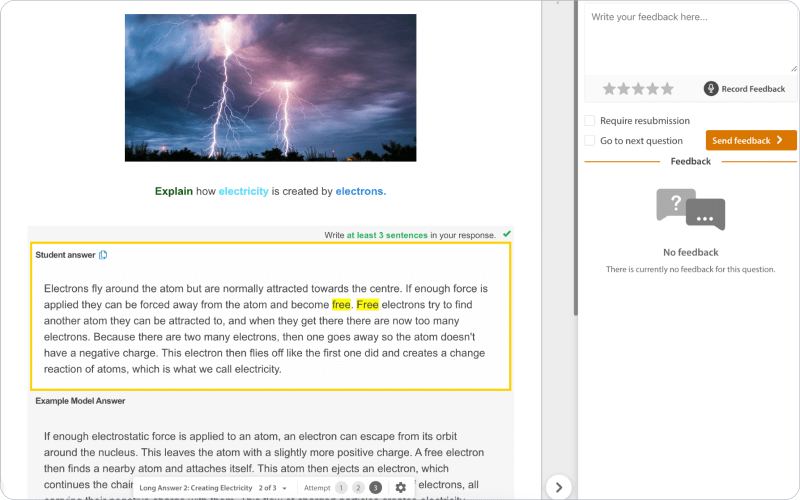
EP is also developing new ways to support different levels of feedback by using artificial intelligence (AI). This will give students automotive feedback based on their extended feedback questions.
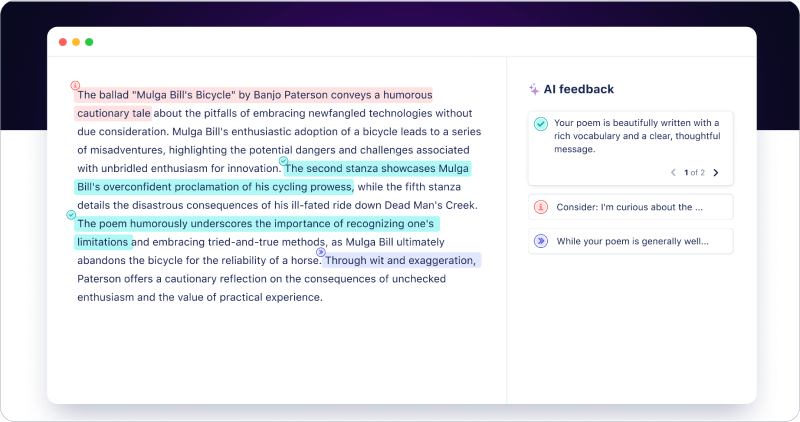
We can’t wait for this feature to be released in late 2024.
Fostering student self-regulation
There are several ways that the EP platform can support self-regulation feedback, including allowing:
- Students to self-evaluate their work
- Students to write reflection paragraphs after each lesson
- Teachers to customise individual student lessons and assessments
EP also facilitates 1:1 and small group conversations, which can help to decide the students’ next learning steps.
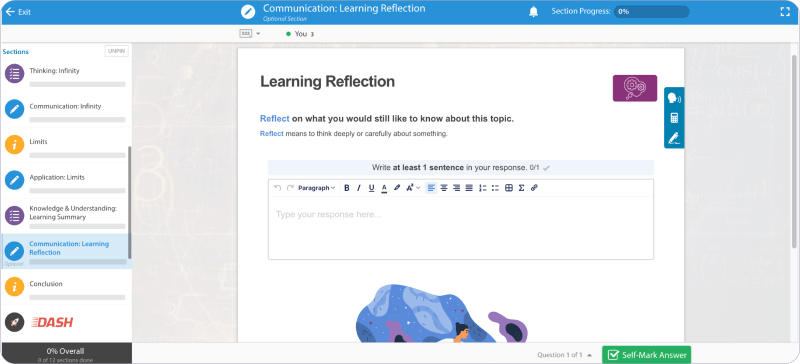
It was so beneficial to hear Mary’s insights into student feedback, and to see all the interaction we have with the audience and their questions during the webinar. This definitely generated some valuable discussion.
If you’d like to watch a recording of the webinar, register here.
Author bio

Philippa Kruger | Curriculum Specialist – Global Languages and International Schools
Philippa is a former French teacher, with over a decade of teaching experience, including 5 years as Head of Faculty. For the last nine years, Philippa has worked with EP Languages to transform the platform from a simple vocabulary tool into a learning ecosystem, catering to all language needs.
Introduction to Building Thinking Classrooms
The Core Pillars of BTC
- Problem-based learning: Engages students with real-world problems and enhances critical thinking skills.
- Check Your Understanding opportunities (CYUs): Recontextualizes homework for students.
- Collaborative learning: Promotes teamwork, allowing students to learn from and with each other.
- Vertical Non-Permanent Surfaces (VNPS): Encourages physical and mental movement, making thinking visible and promoting risk-taking in problem-solving.
- Random and flexible grouping: Ensures diverse perspectives and interactions, fostering a dynamic learning community.
- Oral and written communication: Develops essential communication skills, preparing students for future success.
- Teacher as facilitator: Shifts the role from lecturer to guide, empowering students to take charge of their learning.
- Classroom environment adaptability: Creates an inclusive and supportive environment that is conducive to learning.
- Autonomy and accountability: Cultivates a sense of responsibility and independence in students.
- Assessing for learning: Helps students to see where they are and where they are going.
Integration with Education Perfect (EP)
| BTC concept | How EP can support you |
| Problem-based learning
Engages students with real-world problems and enhances critical thinking skills. |
A Real-World Focus
EP enriches the classroom with problem-based learning opportunities that challenge students to apply critical thinking to real-world scenarios. Teachers can utilize EP’s resources to engage students in meaningful problem-solving, enhancing their critical thinking skills and making learning relevant. |
| Check Your Understanding opportunities (CYUs)
Recontextualizes homework for students. |
Personalized support
EP transforms traditional homework into self-paced learning opportunities, enabling teachers to offer lessons that aren’t formally assigned but are available for students. This allows teachers to monitor understanding through instant feedback, providing insights into each student’s progress. EP modifies the BTC approach by leveraging technology to support informal assessments and personalized learning paths. |
| Random and flexible grouping
Ensures diverse perspectives and interactions, fostering a dynamic learning community. |
Implementing new ideas
EP’s platform supports random grouping for tasks, helping teachers to ensure a diverse exchange of ideas among students. This feature aligns with the BTC strategy of varied team compositions, promoting a classroom culture of inclusivity and fresh perspectives. |
| Thinking and communication
Develops essential communication skills, preparing students for future success. |
Platform flexibility
EP supports the development of mathematical communication skills through assignments that require detailed explanations and forums for discussion. Teachers can leverage these features to encourage students to articulate their thinking both orally and in writing, in line with BTC’s emphasis on expressive skills. |
| Teacher as facilitator
Shifts the role from lecturer to guide, empowering students to take charge of their learning. |
Analytics and insights
EP equips teachers with detailed analytics and progress tracking, empowering them to identify areas where students may need additional support. This functionality enhances the teacher’s role as a facilitator, enabling a more tailored and responsive instructional approach. |
| Classroom environment adaptability
Creates an inclusive and supportive environment conducive to learning. |
Customizable content
The flexibility of EP’s content allows teachers to adjust the learning environment to meet the shifting needs of their classroom. This adaptability supports BTC’s aim for a responsive, student-centered learning experience. |
| Autonomy and accountability
Cultivates a sense of responsibility and independence in students. |
Balance
EP enables teachers to foster a learning environment that balances student autonomy with accountability. This approach encourages self-directed learning while ensuring students remain focused and engaged, supporting a classroom culture of independence and responsibility. |
| Assessing for learning
Helps students to see where they are and where they are going. |
Comprehensive data
EP provides a broad spectrum of evaluative data beyond traditional grades, including quiz results and mastery attempts. Teachers can integrate this data with their own observations to form a holistic view of student progress, reflecting BTC’s comprehensive approach to assessment. |
Impact on Learning
- Personalized Learning: EP’s adaptive technology can tailor educational content to meet individual student needs, aligning with BTC’s emphasis on fostering autonomy and critical thinking.
- Enhanced Engagement: The interactive and collaborative nature of BTC, combined with EP’s engaging digital resources, can increase student motivation and participation in the learning process.
- Data-Driven Insights: EP’s analytics provide educators with valuable insights into student performance and understanding, enabling them to adjust teaching strategies in alignment with BTC principles for maximized learning outcomes.
Potential for Classroom Transformation
- Foster critical thinking: By leveraging EP’s resources within a BTC framework, teachers can create diverse problem-solving opportunities that challenge students to think critically and creatively.
- Adapt to diverse learning styles: The flexibility of EP’s digital platform, combined with BTC’s inclusive teaching approach, can cater to a wide range of learning preferences, ensuring that all students are given the opportunity to succeed.
Elevate Your Educational Practice
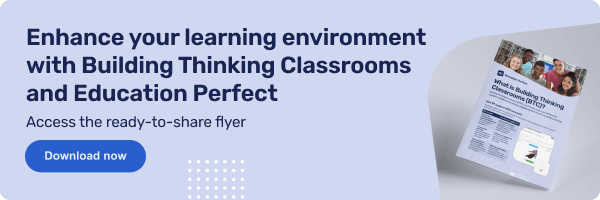
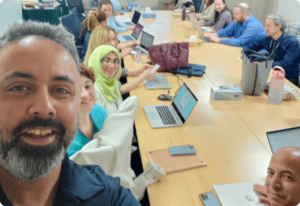
Whilst on my recent school visits in the United Arab Emirates (UAE), I was delighted to see educators using the full Education Perfect (EP) toolkit for consolidation in several interesting and exciting ways.
While visiting these schools, I met teachers using EP in the following creative ways:
To create quick lesson starters
Students spent the first five to ten minutes of every class getting settled by attempting a short quiz. The quiz consisted of ten short questions chosen from an EP question bank with thousands of options. The quiz allowed up to 99 attempts, so students could build on previous mistakes, and improve their knowledge and understanding. Students received immediate visual feedback, exactly how I imagine formative feedback should be provided!
To personalise learning for every student
Teachers supplied students with information slides for their current topic. Students were then tasked with completing an assessment based on the supplied materials in order to gauge their comprehension and learning styles. Based on the results of these assessments, teachers manually provided students with recommended next steps, as proposed by EP. This helped each student bridge the gaps in their learning.
Students were given adapted revision questions as homework. These questions were personalised based on their understanding as indicated in their assessments. This is a great way of focussing on individualised learning and adaptive learning pathways!
To accommodate EP’s suggested Best Practices
This was my favourite use of EP from my school visits! I witnessed teachers using EP’s Rotation Activities and Learning Stations beautifully. The teachers sorted students into groups of four and asked them to reflect on their recent learnings in a computer lab. Students were then provided with four different EP Lessons to revise and a final game of DASH; an interactive activity to see how much knowledge they have retained. Teachers can even play DASH with their students!
While not exhaustive, quick lessons, personalised learning, and best practices are perfect examples of how to consolidate student learning with EdTech. EP’s beauty lies in its capacity to customise and generate personalised resources for every student.
Teachers can create unique lessons and revision material for students that can be accessed anywhere, anytime. With 24/7 support, students can hop onto EP at home, at school – or anywhere with an internet connection.
EP allows students to learn, revise and improve independently. By consolidating learning resources onto a single user-friendly platform, students can engage with content, gamified activities, and revision notes as they like.
How are you consolidating your students’ learnings using EP? Let us know at global@educationperfect.com
Author bio

Ravi Sekhon | Customer Success Manager (MENA & Europe)
Ravi has spent the last 20 years in education, 13 years internationally. He has held several roles in educational middle management, such as Head of Mathematics, Head of Pastoral and Senior Teacher. Ravi is a keen advocate of educational technology and has helped many schools across Europe and the UAE establish their resources and, more specifically, the EP platform, into their workplaces.
]]>
The power of formative assessment
Identifying student capabilities and guiding future learning[/vc_column_text][vc_raw_html]JTNDZGl2JTIwY2xhc3MlM0QlMjJiYWNrZ3JvdW5kLXBhdHRlcm4lMjBkb3RzJTIyJTNFJTNDaW1nJTIwc3JjJTNEJTIyaHR0cHMlM0ElMkYlMkZ3d3cuZWR1Y2F0aW9ucGVyZmVjdC5jb20lMkZ3cC1jb250ZW50JTJGdXBsb2FkcyUyRjIwMjMlMkYxMiUyRmJhY2tncm91bmQtcGF0dGVybi1kb3RzLnBuZyUyMiUyMGFsdCUzRCUyMkRvdHMlMjBwYXR0ZXJzbiUyMiUzRSUzQyUyRmRpdiUzRQ==[/vc_raw_html][/vc_column][vc_column width=”1/2″][vc_raw_html]JTNDZGl2JTIwY2xhc3MlM0QlMjJiYWNrZ3JvdW5kLXBhdHRlcm4lMjBkb3RzJTIwcmlnaHQlMjIlM0UlM0NpbWclMjBzcmMlM0QlMjJodHRwcyUzQSUyRiUyRnd3dy5lZHVjYXRpb25wZXJmZWN0LmNvbSUyRndwLWNvbnRlbnQlMkZ1cGxvYWRzJTJGMjAyMyUyRjEyJTJGYmFja2dyb3VuZC1wYXR0ZXJuLWRvdHMucG5nJTIyJTIwYWx0JTNEJTIyRG90cyUyMHBhdHRlcnNuJTIyJTNFJTNDJTJGZGl2JTNF[/vc_raw_html][vc_row_inner el_class=”row644″ css=”.vc_custom_1705462731837{padding-top: 30px !important;padding-right: 30px !important;padding-bottom: 0px !important;padding-left: 30px !important;background-color: #ffffff !important;border-radius: 15px !important;}”][vc_column_inner][vc_column_text]
Download for free
[/vc_column_text][vc_raw_html]JTNDc2NyaXB0JTIwY2hhcnNldCUzRCUyMnV0Zi04JTIyJTIwdHlwZSUzRCUyMnRleHQlMkZqYXZhc2NyaXB0JTIyJTIwc3JjJTNEJTIyJTJGJTJGanMuaHNmb3Jtcy5uZXQlMkZmb3JtcyUyRmVtYmVkJTJGdjIuanMlMjIlM0UlM0MlMkZzY3JpcHQlM0UlMEElM0NzY3JpcHQlM0UlMEElMjAlMjBoYnNwdC5mb3Jtcy5jcmVhdGUlMjglN0IlMEElMjAlMjAlMjAlMjByZWdpb24lM0ElMjAlMjJuYTElMjIlMkMlMEElMjAlMjAlMjAlMjBwb3J0YWxJZCUzQSUyMCUyMjgwODYxMzclMjIlMkMlMEElMjAlMjAlMjAlMjBmb3JtSWQlM0ElMjAlMjI0MWQyNzg1NS05YjlkLTQwMDAtYjQ4Ny0wMDc3MjljODgxYjIlMjIlMkMlMEElMjAlMjAlMjAlMjBvbkZvcm1TdWJtaXR0ZWQlM0ElMjBmdW5jdGlvbiUyOCUyOSU3QiUwQSUyMCUyMCUyMCUyMCUyMCUyMCUyMCUyMHdpbmRvdy5kYXRhTGF5ZXIucHVzaCUyOCU3QmV2ZW50JTNBJTIwJTI3aHVic3BvdEZvcm1TdWJtaXR0ZWQlMjclMkMlMjBta3RnRm9ybU5hbWUlM0ElMjAlMjd3aGl0ZXBhcGVyJTI3JTdEJTI5JTNCJTBBJTIwJTIwJTIwJTIwJTIwJTIwJTIwJTIwd2luZG93Lm9wZW4lMjglMjdodHRwcyUzQSUyRiUyRnd3dy5lZHVjYXRpb25wZXJmZWN0LmNvbSUyRndwLWNvbnRlbnQlMkZ1cGxvYWRzJTJGMjAyMyUyRjA1JTJGRm9ybWF0aXZlLUFzc2Vzc21lbnQucGRmJTI3JTJDJTIwJTI3X2JsYW5rJTI3JTI5JTNCJTBBZG9jdW1lbnQucXVlcnlTZWxlY3RvciUyOCUyNy5iYWNrZ3JvdW5kLXBhdHRlcm4uZG90cyUyNyUyOS5zdHlsZS5kaXNwbGF5JTIwJTNEJTIwJTI3bm9uZSUyNyUzQiUwQSUyMCUyMCUyMCUyMCU3RCUwQSUyMCUyMCU3RCUyOSUzQiUwQSUzQyUyRnNjcmlwdCUzRQ==[/vc_raw_html][/vc_column_inner][/vc_row_inner][/vc_column][/vc_row][vc_row full_width=”stretch_row” css=”.vc_custom_1704923707130{padding-top: 4rem !important;padding-bottom: 0px !important;background-color: #ffffff !important;}”][vc_column width=”2/3″][vc_column_text css=”.vc_custom_1706764143050{margin-bottom: 0px !important;}”]Technology plays a critical role in formative assessment processes and enabling teachers to reinvest time back into delivering student outcomes. Citing industry research, this report explores the significant gains in student achievement when formative assessment processes are implemented. Education Perfect’s (EP) collated data reinforces this research, indicating that student learning growth doubles when students are assigned individualised next steps through EP.[/vc_column_text][vc_column_text css=”.vc_custom_1704862625389{margin-top: 26px !important;margin-bottom: 0px !important;}”]
Share this
[/vc_column_text][vc_raw_html]JTNDc3R5bGUlM0UlMEEuc29jaWFsLWljb25zLWNvbnRhaW5lciUyMCU3QiUwQSUyMCUyMCUyMCUyMGRpc3BsYXklM0ElMjBncmlkJTNCJTBBJTIwJTIwJTIwJTIwZ3JpZC10ZW1wbGF0ZS1jb2x1bW5zJTNBJTIwcmVwZWF0JTI4NCUyQyUyMDFmciUyOSUzQiUwQSUyMCUyMCUyMCUyMGdhcCUzQSUyMDhweCUzQiUwQSUyMCUyMCUyMCUyMG1heC13aWR0aCUzQSUyMDE4MHB4JTNCJTBBJTIwJTIwJTIwJTIwbWFyZ2luLXRvcCUzQSUyMDFyZW0lM0IlMEElN0QlMEEuaWNvbi13cmFwcGVyJTIwJTdCJTBBJTIwJTIwJTIwJTIwcGFkZGluZyUzQSUyMDRweCUzQiUwQSUyMCUyMCUyMCUyMGRpc3BsYXklM0ElMjBmbGV4JTNCJTBBJTIwJTIwJTIwJTIwanVzdGlmeS1jb250ZW50JTNBJTIwY2VudGVyJTNCJTBBJTIwJTIwJTIwJTIwYWxpZ24taXRlbXMlM0ElMjBjZW50ZXIlM0IlMEElN0QlMEEuaWNvbiUyMCU3QiUwQSUyMCUyMCUyMCUyMGhlaWdodCUzQSUyMDMycHglM0IlMEElMjAlMjAlMjAlMjB3aWR0aCUzQSUyMDMycHglM0IlMEElMjAlMjAlMjAlMjBtYXgtd2lkdGglM0ElMjBhdXRvJTNCJTBBJTIwJTIwJTIwJTIwY3Vyc29yJTNBJTIwcG9pbnRlciUzQiUwQSU3RCUwQSUzQyUyRnN0eWxlJTNFJTBBJTNDZGl2JTIwY2xhc3MlM0QlMjJzb2NpYWwtaWNvbnMtY29udGFpbmVyJTIyJTNFJTBBJTIwJTIwJTIwJTIwJTNDZGl2JTIwY2xhc3MlM0QlMjJpY29uLXdyYXBwZXIlMjIlMjBvbmNsaWNrJTNEJTIyY29weVBhZ2VVcmwlMjglMjklMjIlM0UlMEElMjAlMjAlMjAlMjAlMjAlMjAlMjAlMjAlM0NpbWclMjBzcmMlM0QlMjJodHRwcyUzQSUyRiUyRnd3dy5lZHVjYXRpb25wZXJmZWN0LmNvbSUyRndwLWNvbnRlbnQlMkZ1cGxvYWRzJTJGMjAyMyUyRjEyJTJGaWNvbi1saW5rLnBuZyUyMiUyMGFsdCUzRCUyMlNoYXJlJTIwbGluayUyMiUyMGNsYXNzJTNEJTIyaWNvbiUyMiUyMHN0eWxlJTNEJTIyaGVpZ2h0JTNBJTIwMjRweCUzQiUyMHdpZHRoJTNBJTIwMjRweCUzQiUyMiUzRSUwQSUyMCUyMCUyMCUyMCUzQyUyRmRpdiUzRSUwQSUyMCUyMCUyMCUyMCUzQ2RpdiUyMGNsYXNzJTNEJTIyaWNvbi13cmFwcGVyJTIyJTIwb25jbGljayUzRCUyMnNoYXJlT25MaW5rZWRJbiUyOCUyOSUyMiUzRSUwQSUyMCUyMCUyMCUyMCUyMCUyMCUyMCUyMCUzQ2ltZyUyMHNyYyUzRCUyMmh0dHBzJTNBJTJGJTJGd3d3LmVkdWNhdGlvbnBlcmZlY3QuY29tJTJGd3AtY29udGVudCUyRnVwbG9hZHMlMkYyMDIzJTJGMTIlMkZpY29uLWxpbmtlZGluLnBuZyUyMiUyMGFsdCUzRCUyMkxpbmtlZEluJTIwc2hhcmUlMjBsaW5rJTIyJTIwY2xhc3MlM0QlMjJpY29uJTIyJTNFJTBBJTIwJTIwJTIwJTIwJTNDJTJGZGl2JTNFJTBBJTIwJTIwJTIwJTIwJTNDZGl2JTIwY2xhc3MlM0QlMjJpY29uLXdyYXBwZXIlMjIlMjBvbmNsaWNrJTNEJTIyc2hhcmVPblR3aXR0ZXIlMjglMjklMjIlM0UlMEElMjAlMjAlMjAlMjAlMjAlMjAlMjAlMjAlM0NpbWclMjBzcmMlM0QlMjJodHRwcyUzQSUyRiUyRnd3dy5lZHVjYXRpb25wZXJmZWN0LmNvbSUyRndwLWNvbnRlbnQlMkZ1cGxvYWRzJTJGMjAyMyUyRjEyJTJGaWNvbi10d2l0dGVyLnBuZyUyMiUyMGFsdCUzRCUyMlR3aXR0ZXIlMjBzaGFyZSUyMGxpbmslMjIlMjBjbGFzcyUzRCUyMmljb24lMjIlM0UlMEElMjAlMjAlMjAlMjAlM0MlMkZkaXYlM0UlMEElMjAlMjAlMjAlMjAlM0NkaXYlMjBjbGFzcyUzRCUyMmljb24td3JhcHBlciUyMiUyMG9uY2xpY2slM0QlMjJzaGFyZU9uRmFjZWJvb2slMjglMjklMjIlM0UlMEElMjAlMjAlMjAlMjAlMjAlMjAlMjAlMjAlM0NpbWclMjBzcmMlM0QlMjJodHRwcyUzQSUyRiUyRnd3dy5lZHVjYXRpb25wZXJmZWN0LmNvbSUyRndwLWNvbnRlbnQlMkZ1cGxvYWRzJTJGMjAyMyUyRjEyJTJGaWNvbi1mYWNlYm9vay5wbmclMjIlMjBhbHQlM0QlMjJGYWNlYm9vayUyMHNoYXJlJTIwbGluayUyMiUyMGNsYXNzJTNEJTIyaWNvbiUyMiUzRSUwQSUyMCUyMCUyMCUyMCUzQyUyRmRpdiUzRSUwQSUzQyUyRmRpdiUzRQ==[/vc_raw_html][/vc_column][vc_column width=”1/3″][vc_single_image image=”20253″ img_size=”full” alignment=”center”][/vc_column][/vc_row][vc_row full_width=”stretch_row” css=”.vc_custom_1706844112670{padding-top: 2rem !important;padding-bottom: 2rem !important;background-color: #ffffff !important;}”][vc_column][vc_column_text css=”.vc_custom_1704924582661{margin-bottom: 3rem !important;}” el_class=”webinar-heading-2 mobile-center”]
Related Whitepapers
[/vc_column_text][vc_basic_grid post_type=”whitepaper” max_items=”3″ style=”load-more” items_per_page=”9″ show_filter=”yes” item=”20134″ initial_loading_animation=”none” grid_id=”vc_gid:1706844987583-b3427375ec67426a3d7f567e8f298281-10″ filter_source=”category” exclude=”20249″][/vc_column][/vc_row]
]]>Education Perfect positively impacts NAPLAN results
2022 NAPLAN Impact Analysis Report[/vc_column_text][vc_raw_html]JTNDZGl2JTIwY2xhc3MlM0QlMjJiYWNrZ3JvdW5kLXBhdHRlcm4lMjBkb3RzJTIyJTNFJTNDaW1nJTIwc3JjJTNEJTIyaHR0cHMlM0ElMkYlMkZ3d3cuZWR1Y2F0aW9ucGVyZmVjdC5jb20lMkZ3cC1jb250ZW50JTJGdXBsb2FkcyUyRjIwMjMlMkYxMiUyRmJhY2tncm91bmQtcGF0dGVybi1kb3RzLnBuZyUyMiUyMGFsdCUzRCUyMkRvdHMlMjBwYXR0ZXJzbiUyMiUzRSUzQyUyRmRpdiUzRQ==[/vc_raw_html][/vc_column][vc_column width=”1/2″][vc_raw_html]JTNDZGl2JTIwY2xhc3MlM0QlMjJiYWNrZ3JvdW5kLXBhdHRlcm4lMjBkb3RzJTIwcmlnaHQlMjIlM0UlM0NpbWclMjBzcmMlM0QlMjJodHRwcyUzQSUyRiUyRnd3dy5lZHVjYXRpb25wZXJmZWN0LmNvbSUyRndwLWNvbnRlbnQlMkZ1cGxvYWRzJTJGMjAyMyUyRjEyJTJGYmFja2dyb3VuZC1wYXR0ZXJuLWRvdHMucG5nJTIyJTIwYWx0JTNEJTIyRG90cyUyMHBhdHRlcnNuJTIyJTNFJTNDJTJGZGl2JTNF[/vc_raw_html][vc_row_inner el_class=”row644″ css=”.vc_custom_1705462731837{padding-top: 30px !important;padding-right: 30px !important;padding-bottom: 0px !important;padding-left: 30px !important;background-color: #ffffff !important;border-radius: 15px !important;}”][vc_column_inner][vc_column_text]
Download for free
[/vc_column_text][vc_raw_html]JTNDc2NyaXB0JTIwY2hhcnNldCUzRCUyMnV0Zi04JTIyJTIwdHlwZSUzRCUyMnRleHQlMkZqYXZhc2NyaXB0JTIyJTIwc3JjJTNEJTIyJTJGJTJGanMuaHNmb3Jtcy5uZXQlMkZmb3JtcyUyRmVtYmVkJTJGdjIuanMlMjIlM0UlM0MlMkZzY3JpcHQlM0UlMEElM0NzY3JpcHQlM0UlMEElMjAlMjBoYnNwdC5mb3Jtcy5jcmVhdGUlMjglN0IlMEElMjAlMjAlMjAlMjByZWdpb24lM0ElMjAlMjJuYTElMjIlMkMlMEElMjAlMjAlMjAlMjBwb3J0YWxJZCUzQSUyMCUyMjgwODYxMzclMjIlMkMlMEElMjAlMjAlMjAlMjBmb3JtSWQlM0ElMjAlMjJlNGNmOGU0Mi05ODk0LTRkMWEtYWU4MS02NjNhZTFmZmVmNDIlMjIlMkMlMEElMjAlMjAlMjAlMjBvbkZvcm1TdWJtaXR0ZWQlM0ElMjBmdW5jdGlvbiUyOCUyOSU3QiUwQSUyMCUyMCUyMCUyMCUyMCUyMCUyMCUyMHdpbmRvdy5kYXRhTGF5ZXIucHVzaCUyOCU3QmV2ZW50JTNBJTIwJTI3aHVic3BvdEZvcm1TdWJtaXR0ZWQlMjclMkMlMjBta3RnRm9ybU5hbWUlM0ElMjAlMjd3aGl0ZXBhcGVyJTI3JTdEJTI5JTNCJTBBJTIwJTIwJTIwJTIwJTIwJTIwJTIwJTIwd2luZG93Lm9wZW4lMjglMjdodHRwcyUzQSUyRiUyRnd3dy5lZHVjYXRpb25wZXJmZWN0LmNvbSUyRndwLWNvbnRlbnQlMkZ1cGxvYWRzJTJGMjAyMyUyRjA4JTJGRVAtTkFQTEFOLUltcGFjdC1BbmFseXNpcy5wZGYlMjclMkMlMjAlMjdfYmxhbmslMjclMjklM0IlMEElMjAlMjAlMjAlMjAlMjAlMjAlMjAlMjBkb2N1bWVudC5xdWVyeVNlbGVjdG9yJTI4JTI3LmJhY2tncm91bmQtcGF0dGVybi5kb3RzJTI3JTI5LnN0eWxlLmRpc3BsYXklMjAlM0QlMjAlMjdub25lJTI3JTNCJTBBJTIwJTIwJTIwJTIwJTdEJTBBJTIwJTIwJTdEJTI5JTNCJTBBJTNDJTJGc2NyaXB0JTNF[/vc_raw_html][/vc_column_inner][/vc_row_inner][/vc_column][/vc_row][vc_row full_width=”stretch_row” css=”.vc_custom_1704923707130{padding-top: 4rem !important;padding-bottom: 0px !important;background-color: #ffffff !important;}”][vc_column width=”2/3″][vc_column_text css=”.vc_custom_1705461961919{margin-bottom: 0px !important;}”]As a resource utilised by over 5,000 global schools, it’s critical that Education Perfect (EP) carries out regular explorations into its impact on student engagement and learning growth. In 2022, EP conducted a longitudinal investigation into how the use of EP English and EP Maths lessons affect Australian student outcomes. Looking at NAPLAN literacy and numeracy results, this report displays the results of EP’s comparative analysis.[/vc_column_text][vc_column_text css=”.vc_custom_1704862625389{margin-top: 26px !important;margin-bottom: 0px !important;}”]
Share this
[/vc_column_text][vc_raw_html]JTNDc3R5bGUlM0UlMEEuc29jaWFsLWljb25zLWNvbnRhaW5lciUyMCU3QiUwQSUyMCUyMCUyMCUyMGRpc3BsYXklM0ElMjBncmlkJTNCJTBBJTIwJTIwJTIwJTIwZ3JpZC10ZW1wbGF0ZS1jb2x1bW5zJTNBJTIwcmVwZWF0JTI4NCUyQyUyMDFmciUyOSUzQiUwQSUyMCUyMCUyMCUyMGdhcCUzQSUyMDhweCUzQiUwQSUyMCUyMCUyMCUyMG1heC13aWR0aCUzQSUyMDE4MHB4JTNCJTBBJTIwJTIwJTIwJTIwbWFyZ2luLXRvcCUzQSUyMDFyZW0lM0IlMEElN0QlMEEuaWNvbi13cmFwcGVyJTIwJTdCJTBBJTIwJTIwJTIwJTIwcGFkZGluZyUzQSUyMDRweCUzQiUwQSUyMCUyMCUyMCUyMGRpc3BsYXklM0ElMjBmbGV4JTNCJTBBJTIwJTIwJTIwJTIwanVzdGlmeS1jb250ZW50JTNBJTIwY2VudGVyJTNCJTBBJTIwJTIwJTIwJTIwYWxpZ24taXRlbXMlM0ElMjBjZW50ZXIlM0IlMEElN0QlMEEuaWNvbiUyMCU3QiUwQSUyMCUyMCUyMCUyMGhlaWdodCUzQSUyMDMycHglM0IlMEElMjAlMjAlMjAlMjB3aWR0aCUzQSUyMDMycHglM0IlMEElMjAlMjAlMjAlMjBtYXgtd2lkdGglM0ElMjBhdXRvJTNCJTBBJTIwJTIwJTIwJTIwY3Vyc29yJTNBJTIwcG9pbnRlciUzQiUwQSU3RCUwQSUzQyUyRnN0eWxlJTNFJTBBJTNDZGl2JTIwY2xhc3MlM0QlMjJzb2NpYWwtaWNvbnMtY29udGFpbmVyJTIyJTNFJTBBJTIwJTIwJTIwJTIwJTNDZGl2JTIwY2xhc3MlM0QlMjJpY29uLXdyYXBwZXIlMjIlMjBvbmNsaWNrJTNEJTIyY29weVBhZ2VVcmwlMjglMjklMjIlM0UlMEElMjAlMjAlMjAlMjAlMjAlMjAlMjAlMjAlM0NpbWclMjBzcmMlM0QlMjJodHRwcyUzQSUyRiUyRnd3dy5lZHVjYXRpb25wZXJmZWN0LmNvbSUyRndwLWNvbnRlbnQlMkZ1cGxvYWRzJTJGMjAyMyUyRjEyJTJGaWNvbi1saW5rLnBuZyUyMiUyMGFsdCUzRCUyMlNoYXJlJTIwbGluayUyMiUyMGNsYXNzJTNEJTIyaWNvbiUyMiUyMHN0eWxlJTNEJTIyaGVpZ2h0JTNBJTIwMjRweCUzQiUyMHdpZHRoJTNBJTIwMjRweCUzQiUyMiUzRSUwQSUyMCUyMCUyMCUyMCUzQyUyRmRpdiUzRSUwQSUyMCUyMCUyMCUyMCUzQ2RpdiUyMGNsYXNzJTNEJTIyaWNvbi13cmFwcGVyJTIyJTIwb25jbGljayUzRCUyMnNoYXJlT25MaW5rZWRJbiUyOCUyOSUyMiUzRSUwQSUyMCUyMCUyMCUyMCUyMCUyMCUyMCUyMCUzQ2ltZyUyMHNyYyUzRCUyMmh0dHBzJTNBJTJGJTJGd3d3LmVkdWNhdGlvbnBlcmZlY3QuY29tJTJGd3AtY29udGVudCUyRnVwbG9hZHMlMkYyMDIzJTJGMTIlMkZpY29uLWxpbmtlZGluLnBuZyUyMiUyMGFsdCUzRCUyMkxpbmtlZEluJTIwc2hhcmUlMjBsaW5rJTIyJTIwY2xhc3MlM0QlMjJpY29uJTIyJTNFJTBBJTIwJTIwJTIwJTIwJTNDJTJGZGl2JTNFJTBBJTIwJTIwJTIwJTIwJTNDZGl2JTIwY2xhc3MlM0QlMjJpY29uLXdyYXBwZXIlMjIlMjBvbmNsaWNrJTNEJTIyc2hhcmVPblR3aXR0ZXIlMjglMjklMjIlM0UlMEElMjAlMjAlMjAlMjAlMjAlMjAlMjAlMjAlM0NpbWclMjBzcmMlM0QlMjJodHRwcyUzQSUyRiUyRnd3dy5lZHVjYXRpb25wZXJmZWN0LmNvbSUyRndwLWNvbnRlbnQlMkZ1cGxvYWRzJTJGMjAyMyUyRjEyJTJGaWNvbi10d2l0dGVyLnBuZyUyMiUyMGFsdCUzRCUyMlR3aXR0ZXIlMjBzaGFyZSUyMGxpbmslMjIlMjBjbGFzcyUzRCUyMmljb24lMjIlM0UlMEElMjAlMjAlMjAlMjAlM0MlMkZkaXYlM0UlMEElMjAlMjAlMjAlMjAlM0NkaXYlMjBjbGFzcyUzRCUyMmljb24td3JhcHBlciUyMiUyMG9uY2xpY2slM0QlMjJzaGFyZU9uRmFjZWJvb2slMjglMjklMjIlM0UlMEElMjAlMjAlMjAlMjAlMjAlMjAlMjAlMjAlM0NpbWclMjBzcmMlM0QlMjJodHRwcyUzQSUyRiUyRnd3dy5lZHVjYXRpb25wZXJmZWN0LmNvbSUyRndwLWNvbnRlbnQlMkZ1cGxvYWRzJTJGMjAyMyUyRjEyJTJGaWNvbi1mYWNlYm9vay5wbmclMjIlMjBhbHQlM0QlMjJGYWNlYm9vayUyMHNoYXJlJTIwbGluayUyMiUyMGNsYXNzJTNEJTIyaWNvbiUyMiUzRSUwQSUyMCUyMCUyMCUyMCUzQyUyRmRpdiUzRSUwQSUzQyUyRmRpdiUzRQ==[/vc_raw_html][/vc_column][vc_column width=”1/3″][vc_single_image image=”20187″ img_size=”full” alignment=”center”][/vc_column][/vc_row][vc_row full_width=”stretch_row” css=”.vc_custom_1705459742199{padding-top: 3px !important;padding-bottom: 4.5rem !important;background-color: #ffffff !important;}”][vc_column][vc_column_text css=”.vc_custom_1704924582661{margin-bottom: 3rem !important;}” el_class=”webinar-heading-2 mobile-center”]
Related Whitepapers
[/vc_column_text][vc_basic_grid post_type=”whitepaper” max_items=”3″ style=”load-more” items_per_page=”9″ show_filter=”yes” item=”20134″ initial_loading_animation=”none” grid_id=”vc_gid:1706847832161-53a3b00ec93320f6bc0bd96110f877a2-8″ filter_source=”category” exclude=”20185″][/vc_column][/vc_row]
]]>But over time I’ve thought about it, and I’ve recently realised that she didn’t remember that I’d looked at the end of year exam paper, panicked, and left never having done the work. She remembered what I was like as a student, the conversations we’d had, and the fact I’d been engaged. She remembered giving me extra books to read because she thought I’d find them interesting.
These days, I look back on walking out on my exams in Year 12 and I think about the 16 year old I was, the absolute terrible state my mental health was in, and honestly I’m surprised I only missed out on passing the year by one test! It’s not a huge surprise that I wasn’t engaged in my schoolwork while I struggled to reconcile the Queer identity I knew I was growing into with the incredibly complicated relationship I had to faith and the church. Especially when I consider I was deliberately avoiding getting support.
But I was so scared of failing that when I missed out on Level 2 of NCEA by a single credit, I told my Mum that “Everything would be better if I wasn’t at that school!” and insisted on transferring, even if it was to the Catholic school (the only other school in town), where I had no friends. That was better than ever seeing my teachers again after failing.
Fast forward to being 21, and I drop out again. This time of university, during the second year of a degree with no real path that can be considered a major. I was taking English and Cinema Studies and Art History and Advertisement, and I was so burned out by illness, my part time job, and by some complications in my home life that I just gave up. I stopped showing up to classes, didn’t turn in work, and when the time came to re-enroll for semester 2, I just didn’t do it.
I wouldn’t go back to that university again, though I did eventually graduate with Honours in English somewhere else.
I was so convinced that despite good relationships with my professors and tutors, and having proved I could do the work, if they knew I’d failed to hand in even one essay, they’d consider me a failure. So I wrote myself off. To me, my value was wound up in my successes, and any failure to live up to expectations removed that value.
So how do we help alleviate that feeling in other people? Personally I’ve gotten better at failing by continuously running into it. Every time I fail at a situation and it doesn’t ruin my life, and the people I respect and love around me don’t abandon me, it proves the horrible part of my brain that believes I only have value when I succeed, wrong.
But experience at failure doesn’t come without cost. If you’re failing for the first time in late high school, like happened to me, it comes with incredible mental stress. It can come at the cost of your dreams for the future, your self worth, even friendships when the mental stress leads to self isolating behaviours.
Or at least, it doesn’t come without cost when it happens in real time and in real life. But there are ways to model failing. Treating failure as a normal part of life and being open with the young people in your life about your own failures can help them to see it’s not the end of the world. Demonstrating care and support for people in your life, or public figures, who have failed at something can show that their value isn’t so tied up in their success. You just need to take a look at Simone Biles’ reaction to people celebrating her choice to prioritise her health during the Tokyo Olympics to see how important that is.
And then there’s simulating failure. Playing out the process of failing, recovering and trying again, or trying something new, in a fictional situation where nobody real is going to pay a cost. A great way to do this is through table top role playing.
You may not be familiar with the term, but you’ll have heard of the phenomenon. Table Top Role Playing Games (TTRPGs) are games that use imaginary scenarios and role playing to tell a story collaboratively. The most famous example is Dungeons and Dragons, but there are thousands of other TTRPGs out there. The one I’d like to show as an example is called Masks: A New Generation.
Masks, by Brendan G. Conway, is a game that could be played at any age (though it’s aimed at teenagers), and in it players take up the role of teenage superheroes who are trying to find their own place in a world that has already seen three generations of supers before them.
The mechanics are fairly simple. When a character wants to take an action they roll 2 six- sided dice and add a number provided by their Label. Labels are signs of how the character sees themselves, like “Danger”, “Mundane”, “Superior”, “Savior”, or “Freak”, and can be moved around by people who have influence over the teen, like their friends, parents and teachers.
Once the label has been added, it maps to success levels. A 7 to 9 is a mixed success, which usually means you do what you set out to do, but there’s a consequence or complication. A 10 or higher means you did it with no qualifications, and a 6 or lower means that you failed.
But it’s not as simple as that. Masks is what is known as a fail-forward system, where instead of halting your progress, failing invites the person playing the wider world and the supervillain to take an action that complicates the situation. Failing doesn’t mean you stop and try again. It means the world gets more complex, and you need to look for a new opportunity to stop the villain (or sneak out of the house to meet up with your friends).
And unlike a board game where you might get left in the dust by the people you’re playing with when something bad happens (think getting thrown in jail in Monopoly), there are other benefits to failing. A teammate could help you out, and give you an extra point to get you from 6 to 7 on the roll, strengthening your relationship with them. But even if they can’t help, you’ll mark tick boxes called “potential” that are how your character grows more powerful, or more into their image of themselves.
Because Masks is about collaborative storytelling, players get the opportunity to suggest ways their plans could have gone wrong when they roll a 6 or lower, ask for help, or describe how their failure makes their character feel, and how it changes their behaviour.
In essence, the game is a safe way to abstract and have conversations that might be otherwise hard to approach. Because the characters are teenagers, they have teenage issues, not just superhero ones. If one of your teammates is upset after a failure, you can roll to try and comfort them, and you can mark a point of “potential” if they open up to you and you have a discussion about what has happened.
Throughout the game, there are opportunities to talk through complicated feelings, collaborate on consequences, and embrace the opportunities failure can present. And you get to do cool superhero stunts in between. What’s not to love?
Masks is by no means the only fail-forward game out there either. There’s one for any genre you can think of. But it’s a great example of how failure complicates our lives, but gives us new opportunities, and shows us different ways to use our potential.
If I hadn’t stuck around my hometown working in the supermarket and trying to make up the last few grades I needed to finish high school, I wouldn’t have discovered that I was capable of working a full time job without sacrificing my creative hobbies. If I hadn’t dropped out of university the first time I never would have moved to the university where I learned about how games use their mechanics to support their storytelling, so I wouldn’t even be writing this article.
So how are we teaching the young people around us to embrace failure and fail-forward?
Find Masks: A New Generation here.
]]>As a teacher and Maths Head of the Department, my biggest challenge was maintaining a healthy work/life balance. I had competing responsibilities such as;
- Spending quality time with my family and friends
- Day-to-day teaching and learning demands, including providing meaningful feedback to my students and being available for them
- Collaborating with my team to administrate the effective running of a Maths department
- Responsibilities to the senior leadership team, including reporting to them on issues pertinent to the current educational climate
- Working with parents and external ed tech providers while focusing on continuous professional development
- And probably what most educators would consider the least important … a duty to myself
Please don’t get me wrong, I loved every minute of it, and at the time, with COVID-19, hybrid, distance and blended learning – education was certainly a hotbed for new and innovative ideas on how best to use one’s resources in teaching their students.
One of my favourite time-saving applications was to use EP in the “flipped learning” model. I could assign the conceptual understanding and reading elements of a lesson to students allowing me to spend more time focusing on the actual application in class.
By only assigning the information slides, I was able to spend less time explaining the concept in class and more time with students on methodologies, calculations and addressing misconceptions. Within a few days, I was getting through the syllabus either on schedule or ahead of time, and this was invaluable in winning back the time spent on exam preparation.
Over the course of a semester, I calculated that with both my exam classes alone, I won back almost one and a half weeks (6 lessons) with each class.
Have you tried this approach and saved time too?
We would love to hear from you; please share your experience here!
]]>